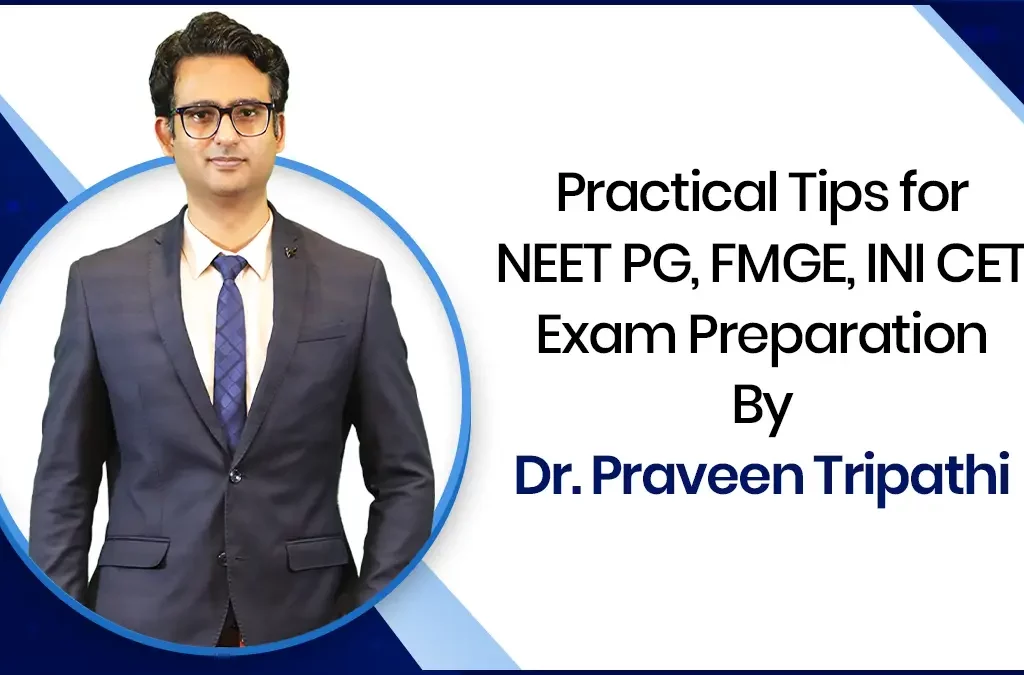Medical aspirants, who are preparing for the NEET PG exam often undergo countless hours of intense study hours. The ever-increasing competition and the vast syllabus of the NEET PG course make it very crucial to find ways to maximize study efficiency.
Your aim should be to maximize your study time and retain as much information as possible. Recent times have been tough for our future doctors, but their resilience and obstinateness have been a constant testament to their hard work and mindset.
Keeping this in mind we have an excellent approach that can guide you through your NEET PG exam preparation and take the stress off your mind. Let’s dive deep to uncover some actionable points that can help you study more and things you can begin doing today!
Importance of Measurement & Deep Study Session:
It is important to measure your preparation and increase productivity. A common concept you must remember is ‘you cannot improve what you do not measure’. This principle is significant in keeping track of your work and identifying the scope of improvement.
Once you have retrospect, the next plan of action you need is something called ‘deep work’. Deep work is hitting the maximal level of your concentration and stretching your brain’s capability to its maximum.
To achieve this, you must eliminate all the distractions. Yes, start with your phone notifications. Switch off your social media and other unnecessary notifications. You need absolute focus on what you are doing and no random thoughts are to enter your mind for that particular period. Yes, easier said than done!
But once you put your intrusive thoughts in the back seat, you experience maximum level of concentration. That’s what a deep session or deep study session is.
Benefits of Deep Study Session:
Deep study session has a spectrum of benefits. An hour of study session may take up to 3 hours because you are distracted. The constant urge to check your Instagram, get an update on your Nykaa Wishlist, share memes, etc. doesn’t allow you to utilize 40% of your brain capabilities.
So, whatever output you get three hours of shallow sessions, deep study sessions give you the same result in an hour. So basically, qualitatively deep study sessions differ from the usual shallow sessions in which we do the studies.
Measuring Your Deep Study Sessions:
We have already established the importance of quality over quantity. Measuring your deep study sessions can help you achieve the maximum level of concentration for a longer period. You can assess your concentration level from 0 to 1 to know the effectiveness of your study session. For instance –
- Maximum concentration – 1
- 75% of your best concentration – 0.75
- Superficial reading with distractions – 0.25
Daily Study Score:
Daily study score amounts to the number of hours you study in a day time your concentration rating. For example, you studied for 10 hours a day with your concentration score being 0.75. Your daily study score comes out to be 10*0.75 which is 7.5.
This is how you can measure your everyday’s hard work and scrutinize areas of improvement. The daily study score approach is much better than making timetables if you are willing to adhere to it and work towards it. Generally, it’s advised to you mark your score on a sheet of paper and stick it on the wall.
A week hence, if your score changes from 5 to 8, you’ll automatically begin observing high-productivity sessions. Keep the urge to get a better number each day on the daily study score and it’ll take a major stress off you. This is why perhaps, studying for 6 hours with deep sessions is better than 10 hours of shallow sessions. Pick the highest level of concentration for a much better output.
Bed To Book Time:
Apart from tracking and measuring your progress, there is another crucial element called ‘Bed to Book Time’. This concept revolves around the whole idea of how you begin your day. The time it takes from waking up to opening your books and starting your studies is called Bed-to-book time. The ideal bed-to-book time must be less than an hour. A shorter bed-to-book time can kickstart your day with a positive tone and you are more likely to study effectively throughout the day. Implementing shorter bed-to-book time in your daily schedule can improve your overall productivity.
Conclusion:
NEET PG preparations can be exhausting but with the right mindset and coaching from Cerebellum Academy faculty, you can reach the pinnacle of your productivity. Not just for the NEET PG exam, but be it FMGE exam preparation, INI CET exam preparation, or PG medical coaching, implementing deep study sessions, measuring your concentration, reducing bed-to-book time, etc. can increase your efficiency while studying.
Cerebellum believes in the importance of enhancing productivity with measurement by recording the daily scores and creating a visual representation of our productivity. This practice not only motivates you but also holds you accountable. A low score can help you push further, improve the next day, and enhance your study efficiency over time. Feel free to share your progress with us so we all can aim for success.

